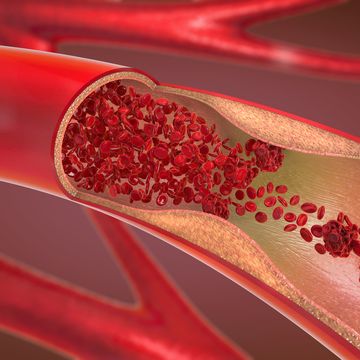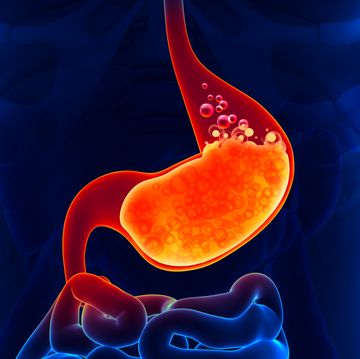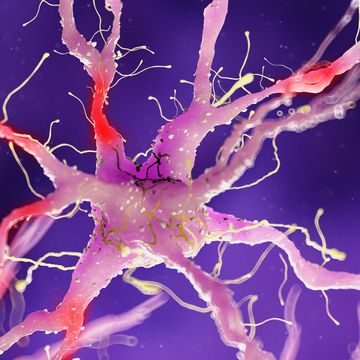There are headaches and then there are migraines. If you suffer from the latter, you know the term "ache" doesn't do them justice. Migraine pain can be paralyzing.
But setting severe head pain aside, migraines are also often accompanied by strange symptoms—stuff other headache sufferers tend not to experience. From those bizarre eye floaters to your super-charged sense of smell, here are explanations for all your odd migraine-related side effects.
MORE: 7 Weird Things Your Teeth Are Trying To Tell You
Vision Splotches
Those spots, flashes of light, or blind spots are called aura. And they're the result of your brain's visual cortex ramping up and slowing down. "It's like a forest fire that blazes and leaves scorched earth,"says Mark Green, MD, director of the Center for Headache and Pain Medicine at New York's Mount Sinai Hospital. Green says your brain's occipital lobe activates nerves and then crashes out, which creates flashing and then dark spots.
"Sometimes people think it's just one eye that experiences the visual aura," says Joseph Safdieh, MD, a neurologist at New York-Presbyterian/Weill Cornell Medical Center. But really, the aura is just confined to your left field of vision. "If you cover your left eye, you'll still experience it in your right eye," Safdieh says.
A Spinning Room
Many people experience a whirling, swirling, "I might throw-up if I don't lie down" feeling during a migraine. Sudden migraine-induced changes in brain chemistry can mess with your inner-ear balance in ways similar to vertigo, which often produces that nauseous sensation. In fact, research suggests migraines and vertigo often go hand in hand.
MORE: 5 Signs You're Not Getting Enough Vitamin D
Limb Tingling
Just as the visual cortex ramps up and down, so do other aspects of your brain activity. Research shows some forms of aura activate sensory nerves in ways that make part of your body tingle. Then the nerves go into a lull and cause numbness. So that tingling and numbness you feel in your hands? That's another byproduct of your haywire brain activity.
Sensitivity To Touch
Like a bad sunburn, some sensory auras cause sharp pain from the lightest touch—a condition called allodynia. It's caused when inflamed blood vessels overexcite the pain nerves in the brain and spine. If you experience this, mention it to your doctor. Why? Triptans, the common prescription drugs used to treat migraines, are less effective when you also experience allodynia.
(Lose up to 13 pounds in 2 weeks with the simple liver detox plan in Heal Your Whole Body!)
Funny Face
Aura of the face, lips, or tongue is called a cheiro-oral, and may affect your ability to speak or eat. A similar type of aura can make you slur your speech, or hampers your ability to recall words. "It makes sufferers worry about a brain tumor or a stroke," says Alexander Mauskop, MD, director and founder of the New York Headache Center. "It's important to see a doctor to figure out what's happening and to seek treatment."
Noxious Odors
You may find scents so intense they make you nauseous. You're not alone: Almost half of all migraine sufferers experience sensitivity to smell—a.k.a., osmophobia, Safdieh says. Unfortunately, it doesn't make fresh baked cookies more appetizing. Instead, those smells overload the brain's olfactory region, and make almost every scent stomach churning.
MORE: 7 Odd Reasons You Bruise Easily
Light Sensitivity
It's not just smells that may seem overpowering. Other brain areas make migraine sufferers more sensitive to light or sound, which is why they look to avoid pain in a quiet, dark place, Mauskop says. Exposure to light causes your optic nerve to send signals to your brain that activate pain receptors. The mechanism is so powerful that even legally blind migraine sufferers experience it, according to a 2010 study in Nature Neuroscience.














